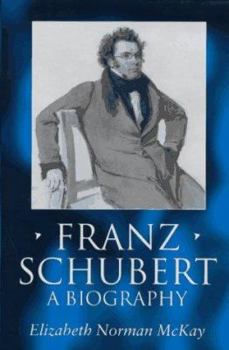Franz Schubert: A Biography
Select Format
Select Condition 
Book Overview
In his short, tumultuous life, Franz Schubert (1797-1828) produced an astonishing amount of music. Symphonies, chamber music, opera, church music, and songs (more than 600 of them) poured forth in profusion. His "Trout" Quintet, his "Unfinished" Symphony, the last three piano sonatas, and above all his song cycles Die Schone Mullerin and Winterreise have come to be universally regarded as belonging to the very greatest works of music? Who was the man who composed this amazing succession of masterpieces, so many of which were either entirely ignored or regarded as failures during his lifetime? In this new biography, Elizabeth McKay paints a vivid portrait of Schubert and his world. She explores his family backround, his education and musical upbringing, his friendships, and his brushes and flirtations with the repressive authorities of Church and State. She discusses his experience of the arts, literature, and theater, and his relations with the professional and amateur musical world of his day. She traces the way Schubert's manic-depression became an increasingly significant influence in his life, responsible at least in part for social inadequacies, professional ineptitude, and idiosyncrasies in his music. And she examines Schubert's decline after he contracted syphilis, looking at its effect on his music and emotional life.
Format:Hardcover
Language:English
ISBN:0198165234
ISBN13:9780198165231
Release Date:August 1996
Publisher:Oxford University Press, USA
Length:400 Pages
Weight:1.80 lbs.
Dimensions:1.0" x 6.4" x 9.6"
Related Subjects
Arts & Literature Arts, Music & Photography Biographical Biographies Biographies & History Biography & History Classical Composers & Musicians Composition Education & Reference History & Criticism Humor & Entertainment Music Musical Genres Performing Arts Theory, Composition & PerformanceCustomer Reviews
2 ratings
EXCELLENT BIOGRAPHY OF SCHUBERT
Published by Thriftbooks.com User , 15 years ago
Franz Peter Schubert (1797-1828) was perhaps the first truly "Romantic" composer. McKay paints a darker portrait of the man than one normally hears. He was virtually a prodigy as a youth. His "productivity over the next few years was astonishing ... in the period from November 1814 to September 1816 while he was working as his father's assistant, Schubert composed in the time left to him after school-teaching some 360 of his total of around 1,000 works. These included four symphonies, four works for the theatre, three Church masses and many shorter sacred works, two string quartets, and some 250 songs." She also notes that "Throughout his early years he based his music on classical forms and structures, with classical textures and instrumentation." In 1819, he began setting more complex and philosophical texts (e.g., by Goethe) to music, with mixed results. A friend of Schubert's reported that "Anyone who knew Schubert knows how he was made of two natures, foreign to each other, how powerfully the craving for pleasure dragged his soul down to the slough of moral degradation." In 1922, "His personal life, however, was moving incerasingly in a socially less admirable direction." McKay suggests that "it is possible that he enjoyed smoking opium, although it is likely he was never addicted to it," and "he was not averse to the sexual favours for sale in brothels or meeting-places for prostitutes, where syphilis was endemic." But ultimately, "A period of capricious sensuality and irresponsibility ceased abruptly at the end of 1822 when he developed the first symptoms of venereal disease." He later became seriously ill "with a recurrence of secondary and infectious syphilis." She reports that "After he contracted syphilis, Schubert was often in pain and distress and lost the capacity for uninhibited joy. His music was frequently born out of suffering..." "His drinking habits became more serious after the onset of syphilis, when he was seeking relief from his worsening depressions..." Unfortunately, "it is probable that some of his friends were unable to tolerate his unpredictable behavior, embarrassed by his abusive outbursts or rages under the influence of alcohol, irritated by his unreliability and ill manners, dismayed or disgusted by some of his sexual activities." In fact, his famous "Unfinished" Symphony was unfinished precisely due to his syphilis. Concerning the suggestion that he was gay, "The possibility that Schubert was homosexual, even a pederast seeking young male partners under the cover of a secret society in Vienna, has been exhaustively aired and argued since the idea was first mooted in 1989. As there is no definitive evidence for or against Schubert's homosexual or bisexual tendencies, the possibility must remain unless or until such evidence emerges. However, whatever his persuasion, his sexual extravagances were an embarrassment to his family and many of his friends; and they were responsible after his death for
Most comprehensive Schubert bio
Published by Thriftbooks.com User , 16 years ago
This book debunks many of the myths about Schubert and shows us the real man. I disagree with the previous comment that it dwells unnecessarily on syphilis and depression. The cheerful, gregarious genius is there as well. One of the great achievements of this book is to show the development of the composer in sympathetic and believable ways. While I am a professional musician, I am glad that the author eschewed musical analyses, which in most composer biographies are both boring and wrong. The book also give enough background about the time and place to allow us to see Schubert in the proper context. As a former resident of Vienna I was happy to see exact locations of houses, concert halls, etc. given. My one small complaint is the organization of the book into both time-periods and subject matter. This made for a bit of repetition and confusion, but was not a serious problem.






